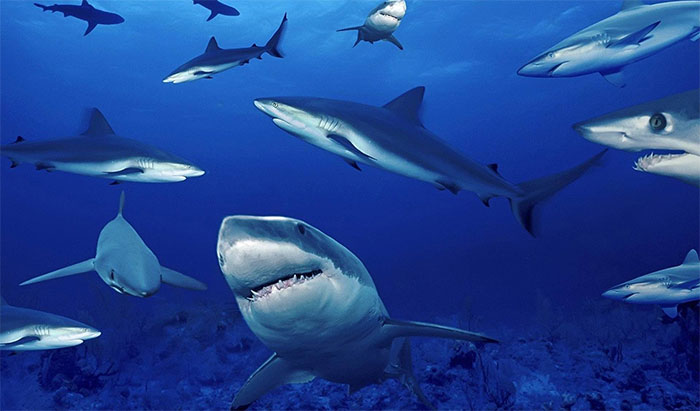What happens if the shark disappears?
The disappearance of top predators such as sharks will cause serious ecological imbalance, causing many other animals to die.
Sharks are successful predators. They have been swimming in the oceans for 400 million years and have diversified over time to settle in rivers and lakes. About 500 species of sharks exist on Earth today and there may be undiscovered species.

Sharks have lived on Earth for hundreds of millions of years.(Photo: Twitter).
Sharks live in ecosystems around the world, including mangroves, tropical coral reefs, and frozen Arctic Ocean. No matter where they live or how big they are, all sharks are predators and play an essential role in the health of the environment, according to Jenny Bortoluzzi, a PhD student in zoology at Trinity University. Dublin, Ireland.
Sharks eliminate sick fish, making sure the fish population is always healthy and in a size suitable for the resources in the habitat. Even the existence of sharks only helps preserve the ecosystem. For example, tiger sharks (Galeocerdo cuvier) living in seagrass fields repel turtles and prevent them from overeating these plants.
Sharks also contribute to coordinating the production of oxygen in the ocean by eating fish that specialize in digesting plankton that release oxygen, according to Victoria Vásquez, a graduate student at Moss Landing Marine Laboratory.
The reef environment is also another good example of the importance of sharks to biodiversity and ecosystems, said Toby Daly-Engel, assistant professor of marine science and director of the Laboratory. Shark conservation at Florida University of Technology. "If sharks disappear, the number of small fish will explode because no species will eat them. Soon, their food includes plankton, microorganisms and small shrimp will be depleted, eventually all small fish will starve, " explained Daly-Engel.
Without sharks, algae and bacteria will invade and cover the reef, making it impossible for corals to photosynthesize."The corals will die, leaving the frame layer later turned to limestone," Daly-Engel said.
Sharks also provide food for ocean predators. White shark sharks plunging into South African beaches are believed to be victims of killer whales.
About 25% of sharks and rays are threatened with extinction, according to the Smithsonian Channel. Because sharks are born small and juveniles are underdeveloped, the number of sharks is not replenished fast enough to compensate for the damage caused by commercial fishing.
- 20-meter shark is extinct because of climate change
- 90% of sharks disappear due to hunting
- Big sharks eat small sharks
- The first shark in history to know ... vegetarian but still healthy
- Catch sharks from prehistoric times
- Install a super-sensitive camera on the shark's body
- Catch a shark with a body like a snake, a mouth of 300 teeth
- The first 'vegetarian' shark in the world
- Introduce the shark shark bracelet
- The killer shark species of the ocean
- Warning of fake shark microbes, made of plastic
- Robot hits the shark
- Catch a shark with two heads
- Discover new shark species in the Atlantic Ocean
 Surprised: Fish that live in the dark ocean still see colors
Surprised: Fish that live in the dark ocean still see colors Japan suddenly caught the creature that caused the earthquake in the legend
Japan suddenly caught the creature that caused the earthquake in the legend A series of gray whale carcasses washed ashore on California's coast
A series of gray whale carcasses washed ashore on California's coast Compare the size of shark species in the world
Compare the size of shark species in the world The world's most mysterious creature has a very 'cool' name, its ancestors lived nearly 400 million years ago!
The world's most mysterious creature has a very 'cool' name, its ancestors lived nearly 400 million years ago!  Killer whale pair kills 17 sharks a day
Killer whale pair kills 17 sharks a day  Crocodile collides with sharks right on the beach
Crocodile collides with sharks right on the beach  Animals humans have never seen the process of giving birth
Animals humans have never seen the process of giving birth  New discoveries about mysterious predatory fish in the ocean
New discoveries about mysterious predatory fish in the ocean  Global warming causes many marine animals to die en masse because of... cold
Global warming causes many marine animals to die en masse because of... cold 